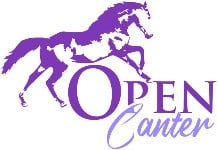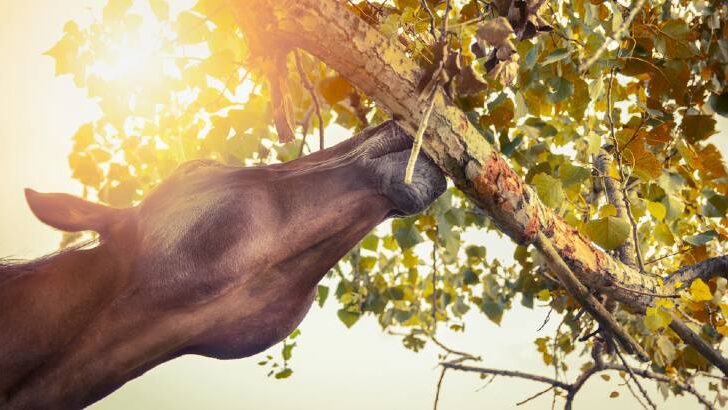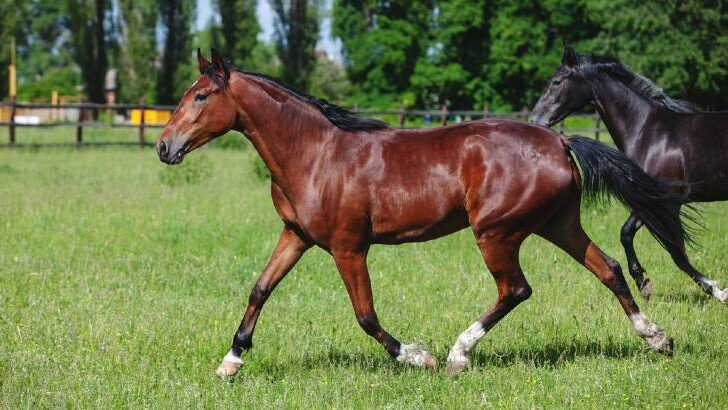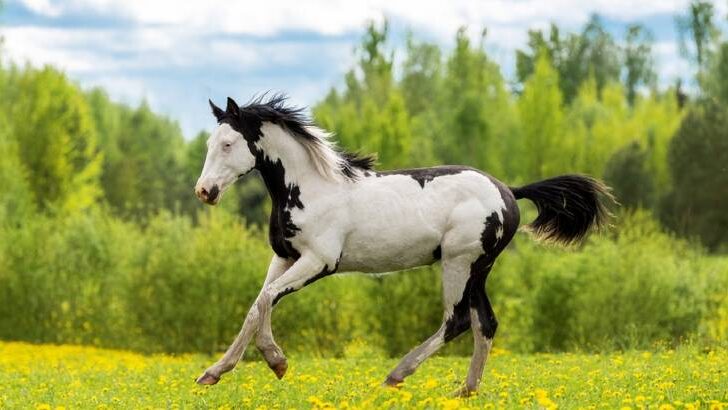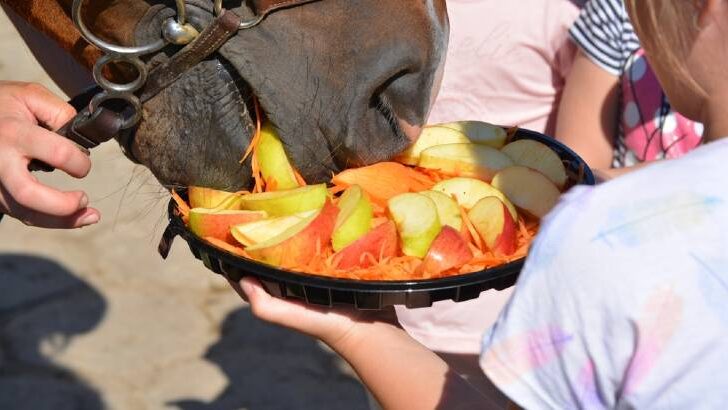Affiliate Disclaimer
As an Amazon Associate I earn from qualifying purchases. It helps me keep the website going. Thank you for your support.
There’s nothing more annoying than seeing those lovely trees in the paddock dying because your horse is ringbarking them by eating the bark! And you just can’t figure out why. As far as you know, the horse isn’t lacking in anything nutritionally. He, or she, certainly looks healthy enough. So why is your horse eating tree bark?
Horses eat strange things for all sorts of weird and wonderful reasons that don’t make much sense to us. Like manure. And tree bark. There are many theories about why they eat tree bark ranging from nutrition to evolution. Boredom. Or maybe because they simply like the taste! Should you be concerned? That depends on the reason and the type of tree. Some tree bark is toxic…
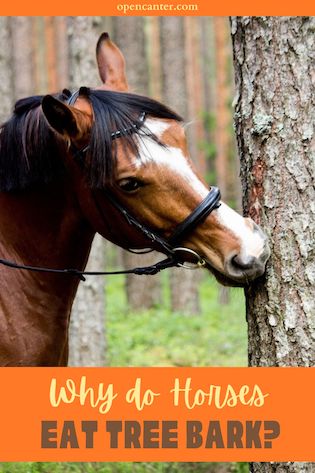
Horses Have Been Eating Tree Bark For A Very Long Time
Dead ringbarked trees are a common sight wherever there is livestock. Particularly horses because, despite all our good intentions, they seem to love chewing on trees. Unless you’ve carefully wrapped the trunks in some type of protective wrapping or put fences around them, chances are you have one or two ring barked trees in your horse paddock too.
Eating tree bark is called bark biting and there are a number of possibilities as to why your horse is doing it. It may be due to any of the following or a combination:
- Nutrition
- Insufficient dietary fiber
- Boredom
- Bad teeth
- Gut disorders
- Stress and anxiety
- Habit
- Evolution
However, we don’t really know for sure exactly why horses eat tree bark.
1) Is Your Horse Eating Tree Bark Because Of Nutrition?
Perhaps. Tree bark contains a range of minerals and other nutrients that may be lacking in your horse’s diet. Which ones depend on the type of tree and where it’s growing. However, most tree bark contains minerals like magnesium, potassium, and calcium. It may also contain copper, iron, manganese, sodium, phosphorus, and zinc amongst others. These are all essential nutrients your horse needs too.
Therefore, if your horse’s feed doesn’t contain enough of these essential nutrients, or they aren’t in the correct ratios for optimum metabolism, it’s entirely possible your horse is eating tree bark to try and get them. If you think this may be the reason, have your horse’s diet analyzed by an equine nutritionist and go from there.
2) Is Your Horse Getting Enough Fibre?
Horses need to eat at least 1 – 2 % of their body weight in fiber each day for optimum health. Thus, fiber or forage should always be the primary component in any horse’s diet. So… if your 500kg (or 1000lb) horse isn’t getting at least 5 kg (or 10 lbs) of hay or forage every day they may be eating tree bark to get more fiber.
Have a look at what you’re feeding your horse in the way of hay, silage, chaff, or grazing. Weigh what you can – obviously, you’ll have to use educated guesswork for grazing – and add it all up. If the total dry weight isn’t the equivalent of 1 – 2% of their body weight you could very well have your bark biting reason.
Another point to make with grazing – if your horse is grazing lush pasture you may assume it’s getting enough fiber. However, lush pasture usually has a very high water content (which is why it’s lush!). Feeds though are always calculated in dry weight.
When you remove the water content of that lush grass from your calculations, you’ll find your horse is actually not getting very much fiber at all from it. This explains the sight of dead trees in the middle of paddocks full of lush green grass!
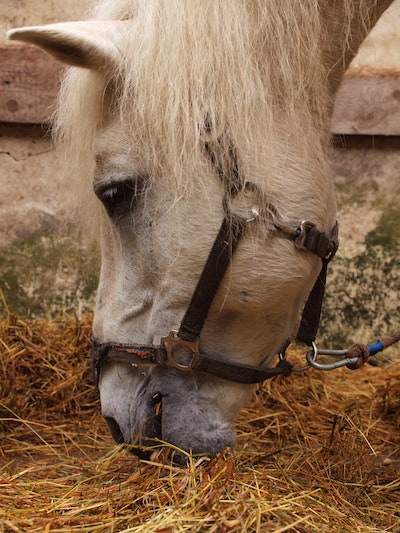
3) Your Horse Is Possibly Eating Tree Bark Because It’s Bored
This is probably one of the major reasons horses eat tree bark. Many domesticated horses spend a lot of their turnout time in small paddocks or yards without a lot of decent grazing.
However, they are natural grazers so their instinct is to spend around 20 hours a day munching on something. Ideally, it should be grass but when that’s not available they’ll turn to whatever else is handy. It may be wooden fencing or it may be that beautiful big tree in their paddock.
Provide hay in slow feeder nets or put a roll out with them in a hay ring. You can also buy nets for rolls that prevent them from eating it too quickly and spreading it everywhere.
4) How Are Your Horses Teeth?
Horses with bad teeth or other oral problems may have trouble chewing hay and grass properly so eat softer tree bark as an alternative. If it’s been a while since your horse had its teeth floated, get them checked.
5) Gastric Disorders Could Cause Your Horse To Eat Tree Bark
Horses sometimes start eating tree bark if they’re not feeling very well. Gastric ulcers for example may cause it and it’s possible eating bark helps relieve the pain. The fiber for example may provide a buffer in their stomach against the stomach acid.
Provide plenty of hay so the horse always has something to eat. If gastric ulcers are suspected, get them treated.
6) Is Stress and Anxiety The Cause?
Horses that have recently been subjected to some type of stressful situation – perhaps you’ve just moved them to a new home or separated them from their herd – can resort to behaviors like eating tree bark.
If this is the reason for your horse eating tree bark, try and put it somewhere without trees until it settles in. Or down. Provide plenty of hay in a slow feeder net. Set a consistent routine. Try to provide a companion, even if it’s just in a neighboring yard or paddock. Give it some exercise and provide mental stimulation.
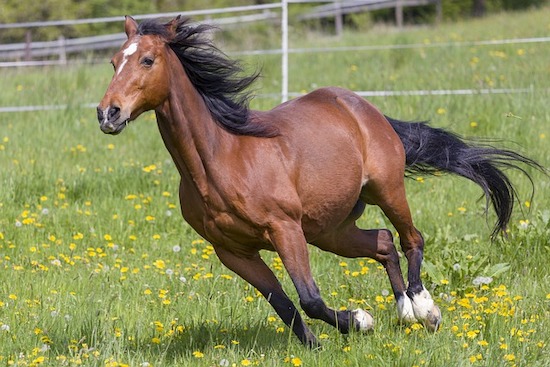
7) Eating Tree Bark Might Just Be A Habit Your Horse Has Developed
Horses develop bad habits very quickly. Bark biting is one. What may have started out as something they did for a reason has turned into something they do just because the trees are available to chew. Or they may develop a liking for the taste of a particular type of tree bark.
Protect the trees. Put some chicken netting around the trunks from ground level to as high as the horses can reach. Alternatively fence them off, although this defeats the purpose of having the trees if they need them for shade or shelter.
Again, make sure they have access to enough forage to keep them occupied.
8) It May Be Related To Their Origins As A Browsing Species
Horses weren’t always a single-toed, plains-dwelling, grass-eating species. Their primitive ancestors were small forest-dwelling browsers who lived on a variety of plant materials. Including bark. There’s a school of thought that believes this primitive heritage contributes to their tree bark eating tendencies.
Providing alternative forages usually stops bark biting behaviors.
Is It OK For Your Horse To Eat Tree Bark?
Once in a while should be OK so long as the tree isn’t toxic. However, it’s definitely not something you want to encourage for a variety of reasons.
Once in a while should be OK so long as the tree isn’t toxic. However, it’s definitely not something you want to encourage for a variety of reasons.
- It damages trees
- It can damage your horse i.e. uneven wear on their teeth leading to ongoing dental issues, getting splinters in their mouth that can cause ulcerations, or in their gut which is a potentially deadly situation if it perforates the intestinal wall.
Another important consideration is that some tree bark is toxic, for example…
- Black walnut bark (and shavings) contains juglone and hydrojuglone which can cause health issues in horses including laminitis [source].
- Red maple bark – all parts of this tree contain gallic acid and tannins that can cause hemolytic anemia if eaten. This is often fatal.[source].
- Oak bark – along with the leaves and acorns, oak bark contains gallotannins, which can cause serious colic and digestive disorders [source]
- Cherry tree bark – the leaves, stems, and bark of cherry trees contain cyanide, a highly toxic compound especially if eaten in sufficient quantities.
- Yew tree bark – yew trees have alkaloids called taxines, which are highly toxic to horses. All parts of the tree are toxic. [source]
Avoid growing any of these trees anywhere near horse paddocks or using any type of bedding that may contain shavings from them.
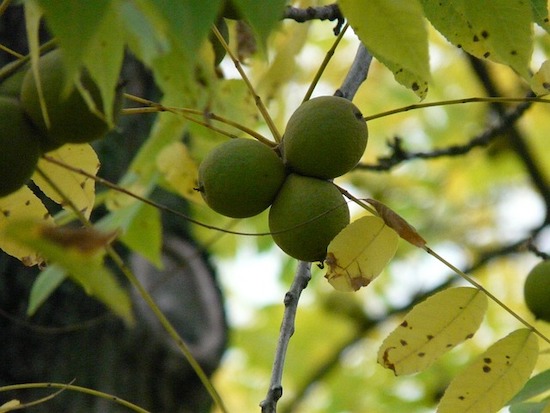
Stopping Your Horse Eating Tree Bark
Prevention is always better than a cure… If you notice your horse eating tree bark and it appears to be more than just a one-off thing, it’s a good idea to try and nip it in the bud before it becomes a full-blown habit.
The best way to do this, regardless of what is causing the behavior, is to provide plenty of alternative forage. That may mean:
- Moving the horse to another paddock with more grazing
- Providing ad-lib hay either in a roll or a slow feeder net
Also, ensure their diet is nutritionally balanced, their teeth are in good order, and they aren’t bored.
Final Thoughts
Although we don’t know exactly why horses eat tree bark, it mostly seems to be caused by boredom, habit, lack of grazing, or not enough fiber. If you happen to notice your horse eating tree bark regularly, first try providing more forage or hay. If that doesn’t work, you’ll need to go investigate other possible reasons, which may involve talking to your vet.
